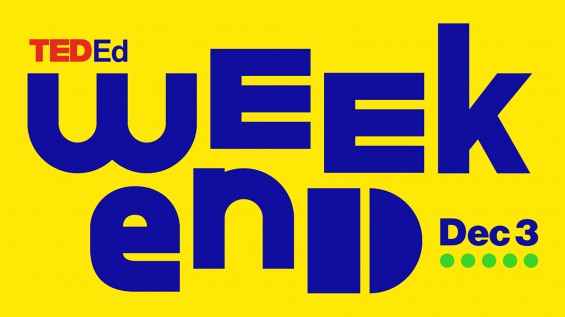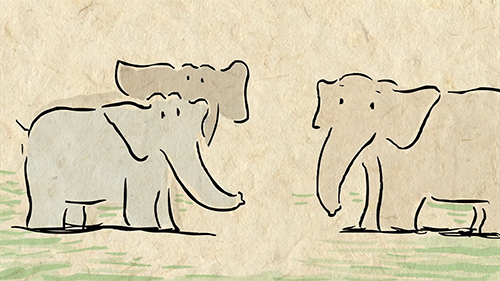
20 books to read in 2015: TED-Ed Educators share their top 5 must-reads

If one of your New Year’s Resolutions was the classic “read more books” and you haven’t so much as opened a magazine, we’re here to provide some inspiration. TED-Ed asked a few of our favorite educators to weigh in on the best books in their subject — for students, teachers and lifelong learners alike — to crack into during 2015. Here, find a list of their top 5 picks in literature, science, math and history.

*Recommendations from TED-Ed Educator Matthew Winkler, author of the ‘What makes a hero?’ lesson.
The Best American Nonrequired Reading by Dave Eggers
Remember your required reading from high school? Impressive samples of literature, certainly, but didn’t you wish for greater variety? Thanks to Dave Eggers, variety is what you’ll find inside each edition of the BANR. A fresh panel of high school students curates a new anthology each year with surprising results.
Aesop’s Fables by Aesop
Aesop’s Fables have survived for 2,500 years because they are as well-constructed and immutable as the pyramids. Written as simple stories about animals, these parables pose ethical dilemmas and consider various responses – human behavior under a microscope. The most telescopic works of literature could all be parsed into the handful of Aesop’s fables that they examine within a broader, deeper context.
The Writing Life by Annie Dillard
This sentence was composed to communicate information, and you are consuming it in the same spirit. In Dillard’s slender manifesto, she reminds us all to elevate this practical transaction, to connect our written words to what is vital and essential. This book will recharge your respect for language and its power in your life.
The Tiger’s Wife: A Novel by Téa Obreht
The Tiger’s Wife is a labyrinth of flashbacks and detours that hypnotizes the reader. The luxurious prose of this National Book Award Finalist draws us forward as the story unfolds, turn by turn. Long after finishing the novel, the reader is haunted by its revelations.
Twenty Love Poems and a Song of Despair: Dual-Language Edition by Pablo Neruda (Author), W.S. Merwin (Translator)
If you are lovestruck, or brokenhearted, or in between these conditions, this book is required reading. Published when the great poet and statesman was only nineteen years old, this collection launched his literary reputation. The dual-language edition is recommended: read the poems aloud and anyone listening is likely to burst into tears, or kiss you, or both.

*Recommendations from TED-Ed Educator Lucianne Walkowicz, author of the ‘Light waves, visible and invisible’ lesson.
The Martian by Andy Weir
The Martian tells the story of astronaut Mark Watney. Separated from and presumed dead by his fellow crewmates while on a Martian expedition, Watney is left behind to struggle for survival. Watney is a plucky, inventive character, immediately likable, and readers will plow through The Martian rooting for him with every word. This book is a delight to read for anyone who loves to think about space travel, or anyone who just loves to tinker, fix things, and solve problems through imaginative DIY solutions. The science in the book is sound and detailed, but woven into the story in a way that makes it accessible and gives the reader a realistic sense of what it might be like to live on another planet.
The Illustrated Man by Ray Bradbury
Though I’ve read a great deal of Ray Bradbury’s work over the years, it’s The Illustrated Man that comes back to me again and again. Prescient about a variety of technologies that exist in some form or another today, imaginative and magical while still being mostly grounded in reality, reading this book is like looking through a window into another dimension.
Surely You’re Joking Mr Feynman by Richard Feynman
Richard Feynman was not only an incredible physicist, but an incredible character as well. Surely You’re Joking is the first in a series of books recounting his own personal anecdotes from his life and scientific career. Irreverent and funny, Feynman’s voice has a cowboy, punk-rock aesthetic that transports the reader to the frontiers of physics as he lived them.
Radioactive by Lauren Redniss
Radioactive is a graphic novel recounting the story of physicists Marie and Pierre Curie. A winner of the Nobel Prize in both physics and chemistry, Marie Curie was also the first female Nobel medalist. This book tells the story not only of her scientific work but of the love story between her and husband Pierre, also an accomplished scientist in his own right. The illustrations are artful, unique and eye catching, setting it apart from other graphic novels on the basic of visual style alone.
Managing Martians by Donna Shirley
Managing Martians was published on the heels of the Mars Pathfinder mission, which brought the first Martian rover, Sojourner, to the Martian surface. Another first for the Pathfinder mission was that it was the first mission to be headed by a woman: Donna Shirley, who tells the story of her life and the mission in this book. Shirley’s story is not only interesting from the standpoint of the mission she led, which began the era of Mars surface exploration that continues today, but as a story of someone who succeeded in a male-dominated field at a time when her options were constantly limited by her gender. Through hard work and a circuitous path, Shirley’s success story is an inspirational one of triumph over struggle.

*Recommendations from Natalya St. Clair, author of the ‘Music and math: The genius of Beethoven,’ ‘The unexpected math behind Van Gogh’s Starry Night’ and ‘Did Shakespeare write his plays?’ lessons.
The Code Book by Simon Singh
This book is for anyone who is interested in learning more about mathematics not normally taught in secondary-level school. Simon Singh spins a compelling tale of the history of cryptography, starting from the ancient ‘Rome and the Caesar’ cipher to future speculation about quantum cryptography. I can remember first reading this book in high school and falling in love with math and physics — which is one of the reasons I majored in math in college! Singh is a great expositor and keeps the history (and math!) alive for a broad audience.
Secrets of Mental Math by Arthur Benjamin
Arthur Benjamin is a professor of mathematics who combines his passions for mathematics and magic in order to create a “mathemagics” show. His TED Talk demonstrating his rapid mental calculations can be viewed here (and TED-Ed Lesson here!). In this book Benjamin discloses all his secrets to computing numbers quickly so that anyone can build his or her own “mathemagics” show. This book is appropriate for all ages and is a joy to read.
Love and Math by Edward Frenkel
Edward Frenkel tells an engaging and personal story of his journey in mathematics. Starting from his childhood under the mentorship of a family friend all the way to his present research in the Langlands Program, mathematics and Frenkel form a relationship that can only be called love. Some of the math is higher level than high school, but Frenkel makes it accessible so that most readers can understand the hidden beauty in mathematics surrounding us. The book recently won the 2015 Euler Book Prize through the Mathematics Association of America.
The Housekeeper and the Professor by Yoko Ogawa
This touching novel brings mathematics to light with an interesting twist. Set in modern Japan, Ogawa tells the story of a “Housekeeper” who takes care of the “Professor,” a mathematician whose short-term memory only lasts about 80 minutes. The Professor builds a relationship with the Housekeeper and her son, “Root,” and all three share equations, stories, and relationships with each other.
Flatland by Edwin Abbot
I include this book not only because it’s a classic, but because it’s also important both for learning some fun mathematics and as learning about Victorian satirical social commentary. The novel features A. Square, a mathematician who lives in a two-dimensional infinitely flat plane, where women are straight lines and men have numbers of sides depending on their social status. There is a great dialogue about different dimensions, starting from the lowly zero-dimensional point all the way to the rather abstract three-dimensional spaceland (so what would a four-dimensional object look like?). For those hoping to “Dig Deeper,” check out Flatland the Movie as well.

*Recommendations from Kathryn Tempest, author of the ‘The great conspiracy against Julius Caesar’ lesson.
Annals and Histories by Tacitus
In these works, the Roman historian Tacitus tells of a world ‘rich in disasters, terrible with battles, torn by civil struggles, horrible even in peace’. This is not my summary, but the words used by Tacitus himself to describe the years following the death of Rome’s first emperor, Augustus, up to and including the death of Domitian (AD 14-96). Featuring some of the most notorious episodes and personalities of Roman history – such as the reign of Nero and the great fire of Rome, the persecution of the Christians, the revolt of Boudicca, and the emperors Tiberius, Caligula and Claudius – the Annals and Histories spin an intriguing, and at times shocking, narrative of the corruption of power in Imperial Rome.
Greek and Roman Lives by Plutarch
I love reading Plutarch’s Lives. If you want to know more about the famous men of Greece and Rome, then these short, accessible and immensely enjoyable biographies are for you. You can find out more about famous generals and statesmen from Alexander the Great to Julius Caesar; read about the political contexts in which men like Pericles and Cicero operated; and even learn all the juicy gossip that circulated about their private lives. Plutarch has a great eye for anecdotes and stories which he uses to illustrate both the personalities and exploits of his subjects, and to draw valuable moral lessons from them. There are numerous editions and translations available but I recommend these versions because, in my opinion, they cover some of the most fascinating lives.
Histories by Herodotus
Herodotus is the ultimate storyteller and, according to one famous verdict, the ‘father of history’ itself. His overarching goal is to explain the great clash between the Greeks and the barbarians which culminated in the Persian wars of 490 and 480-479 BC. But this is no straightforward narrative. Rather, you will find yourself being taken on a wonderful tour of different lands, customs and peoples – all driven by Herodotus’ immense spirit of enquiry. I have only just started reading this new translation by Tom Holland, but it is without doubt one of the best I have read. The excellent introduction and notes by Paul Cartledge are a real added bonus! This book offers a really easy way to learn about Greece’s early history as well as the origins of an entire discipline.
Pompeii: The Life of a Roman Town by Mary Beard
Pompeii never loses its ability to fascinate: from the grandeur of its largest houses down to the daily grind of its inhabitants, the tragedy that struck in AD 79 did not discriminate between its victims. The eruption of Mt Vesuvius left many of thousands dead. ‘But ghoulishness is not the whole story’, says Mary Beard in the introduction to this excellent book on Pompeian life. And what I love is the way she proceeds to tell that story. Beard does not shy away from the academic nitty-gritty or the difficult questions, but takes her reader on a fascinating excavation of the site of this Roman town and the challenges faced in interpreting its remains. The no-nonsense and down to earth approach of this book makes it at once readable, gripping and hugely informative.
Myths and Legends by Anthony Horowitz
I recommend this book because it caters to kids of all sizes, even the grown up ones! Ancient myths and legends continue to enthral and excite everyone who reads or hears them. Yet Anthony Horowitz has such a fantastic and fun writing style that he really makes these stories come alive. Packed full of weird and amazing tales – myths and legends from Greece, Egypt, Rome, China, India and more – it provides a compelling read.
What books would you add to this list? Happy reading! >>




http://en.m.wikipedia.org/wiki/The_Power_of_One_(novel)
Highly recommend this book.
My son and grandsons favorite.
I, too, would put “The Power of One” on my list. And, if you like the book there are many more written by Bryce Courtney. I have read most of them and enjoyed them all.
I agree. Power of One is a wonderful book for teens….
Though i have not heard about any of the books except Aesop’s Fables, I think all will be good… i want to read ‘Myths and Legends’.. knowing different cultures through these stories is good…I love Greek, Korean and Roman mythologies..
Really nice article….thanks for sharing this news…. really useful
The top 5 non-fiction titles I’ve bought in the past year for my students to support the curriculum but also to inspire deeper understanding and interest are:
1. The Ghost Map by Steven Johnson – about the discovery of the cause of the outbreak of cholera in London in the 19th century
2. What if: Serious Scientific Answers to Absurd Hypothetical Questions by Randall Munroe
3. Where Good Ideas Come From – The Natural History of Innovation by Steven Johnson
4. How to Fly a Horse – The Secret History of Creation, Invention and Discovery by Kevin Ashton
5. Start with Why – How Great Leaders Inspire Everyone to Take Action by Simon Sinek
Those sound fascinating. I think I’ll add them to MY list.
wbat about animal farm or 1984. Or anything by Kurt Vonnegut. They need some free thinking in there life
I would follow add to the list the following:
“I Know Why the Caged Birds Sing”by Maya Angelou
“The Book Thief” by Marcus Zuzack
“To Kill a Mockingbird” by Harper Lee
“A Tree Grows in Brooklyn” by Betty Smith
“Boarding School Seasons: American Indian Families, 1900-1940″ (North American Indian Prose Award)
“Superintelligence” by Nick Bostrom
tai lopez booklist
Thanks for sharing this amazing list. I have heard about “Love and Math” from my friend. I will definitely read this book after completing my current book. But I think “Just Jake – Dog Eat Dog” could be added to the list. It is a good book for kids.
thank u so much for amazing list there r many what i have to add on my list
Surprised Sapiens By Harari wasn’t on any of the lists.
“Ion” by Liviu Rebreanu